 I finished a leadership training a couple of weeks ago and paused to thank the participants before we wrapped up. I thanked them for their engagement and their participation. And, I explained to them that I had lost a friend and team member just two weeks before to a tragic and untimely death. After two days of adrenaline facilitating and actually enjoying it, I was clearly and quickly coming down off the high. Through tears, I thanked them for helping me find joy in my work again during such a terrible time. I explained that getting back in there and doing the work was one thing, but I hadn’t yet figured out how I would find joy in it. Fast forward to today, about a month later, when I was out for a run in one of my sacred places, Shelby Park. I’ve been running lately without music because I recognize how noisy my head has been since he died. When I run, I just let my head be noisy until it gets tired and finally quiet. I just let it run while I run. I passed a woman going the other direction whose t-shirt said in bold letters: BRING JOY. I instinctively complimented her and after she’d passed thanked her somewhat to myself. That shirt planted a new thought path amidst the other noise in my head. It quickly dawned on me that I needed to reframe where I am and how I have been thinking about it since my friend’s passing. I need to stop looking for joy, trying to find joy, and instead concentrate on bringing it. Looking seems an endless, outward journey. Bringing feels like an empowering, inward prompt. (That’s a helluva t-shirt.) Over the last month, I’ve been looking. During my search, my “good mornings” to my team were practically non-existent for several weeks. They weren’t “good” mornings. They were shitty mornings. And, I’m shitty at faking it. I just needed to get through the day and get some stuff done and put one foot in front of the other. No more. No less. No joy. This last week, I somewhat unwittingly returned to the “good mornings” but still a bit half-heartedly. I’m trying or perhaps I’m just progressing and it’s not really about effort. I don’t know. I know my “good morning” is not insincere, but it’s also not what it used to be. Better, but joy would be a stretch. This is what was running through my noisy mind thanks to that t-shirt. And then, a bicycle approached going the opposite direction and it had two little girls in some sort of contraption on the back with a dad driving. The girls were facing each other, meaning one of them was looking forward in the direction the bike was going and one looking back to where it had been. As I passed, the girl facing forward broke into my noise with an enthusiastic “hello!” And, by the time I was responding in-kind, the other little girl said “goodbye!” It was cute and funny and kind of brilliant. I kept running now pondering these two little girls and slowly realized something important from that interaction: every moment is both a hello and a goodbye. It passes as quickly as it is acknowledged, often more quickly. This is a simple fact of life. It’s fleeting. Now, to connect that with my previous noise on grief and my t-shirt prompt to “Bring Joy”… Not every moment is joyful. Not by any stretch and not just in the midst of tragedy. Life is complex and always will be. Joy is a function of sorrow and sorrow is a function of joy. But, every moment is, in fact, passing just as certainly as it approached. Hello. Goodbye. Another moment is there waiting. We don’t have to look for it. The shirt didn’t say “be joyful” or “be happy”. It said to “bring joy”. So, what’s the difference? Fundamentally, one is about a state of being we often can’t control. The other is a choice of an action that we usually can. Even in the midst of loss, I can find joy in what my friend/colleague and I created together and bring that joy to new work. I can bring the joy of the memory of his laugh as I face an office full of other friends/colleagues who are laughing but aren’t him. I can bring the joy resonating in the echoes of our absurd jokes and his goofy impersonations as I listen to others joyfully bantering among themselves. I can bring those joys to my current work and the opportunity I have to build on what we started. The joy of what we had. This doesn’t mean it is easy, but it means I have agency and not just aspiration. I can bring joy and not just look for it, not merely hope to find it. Image: https://greatruns.com/nashville-shelby-bottoms-greenway/
3 Comments
Wisdom isn’t inherent in our darkest days, but these days are our clearest path to it.
Perhaps it’s only in the darkness, or at least in the rationing of light, that we can come to appreciate it. Appreciate what it does for us. Appreciate what it makes of us. Appreciate what we are in it. Recognize what it does to others, what they do to it. Who creates it? Who consumes it? The darkness asks us different questions than the light. What does it feel like to be cold? To stay ever damp, the light never coming to dry or to offer warm reprieve? The cold and damp merging and wrapping us and dissolving us? What does it mean to be starved for light? To believe ourselves to be desperate and in need but still knowing the sun will proceed with its plan? No control. Fewer hours. Shorter days. How does gray feel? What are we supposed to do with it? It is a thing, this grayness. It cannot be ignored or explained with - or in contrast to - other colors. We must own it for what it is. What happens when life skins us of our perceived beauty, or our defenses, the leaves that sway and flicker and distract with their color and charm? What’s left? We are merely who we are. What do we do with that? What happens when we feel our bones? The deep ache of brokenness? That dull, radiating sense of being lost, exposed? Bare. These are not questions of death or desperation or darkness. This is life. This is winter. In winter, it is our ability to see what is, not what was, or what could be, or what should be that lets the light break through. The warmth. The growth. In the dark and barren and broken and matter-of-fact of the season, we may see more honestly the layers and cycles and phases of light, of life, of death, of time, of distance, of our place in it all. This is the brutal wisdom of winter. 25 years ago, when I learned to paint and draw, the learning process had nothing to do with technique. In fact, by most people’s standards, it had little to do with painting and drawing at all – at least if I was doing it right. I was being taught to see. Once I could see, I could paint. And, while I don’t paint or draw at this point (someday again), I keep this lesson with me in every aspect of my life. To create, to find meaning, to communicate that meaning, I must be humble enough and patient enough and open enough and diligent enough to see myself and my world in its essence, to understand what it is offering and telling me – and then to create from there. I took a walk in the woods today, and everywhere I turned nature was asking me questions. It caught me off guard honestly. I just wanted to get out and get some exercise with the dog, but the woods wanted me to do more. They wanted me to see. To paint. A self-portrait. To be clear, I didn’t paint a thing – except in my mind. I tried to see what nature wanted me to see; myself, reflected in her. And, in her own constant changing with the wind and the water and the light and the seasons, she made it clear that my portrait was transient too. I am ever becoming a new self, seeing a new self, if I’m willing. So, here’s what she asked. 9 simple questions I should probably answer every day: 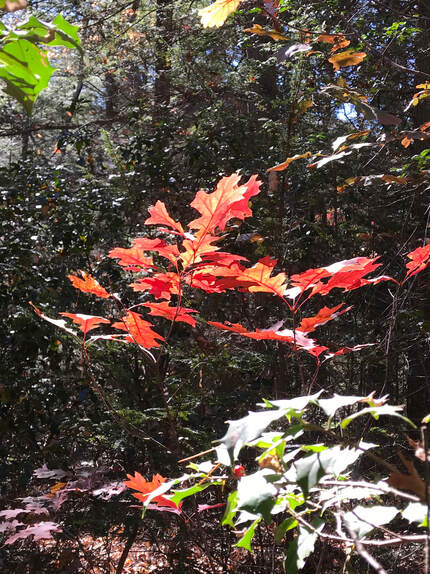 What color are you today? Color is a vibration. It is the perception of energy, wavelengths. So, what is yours today? Is it what you want it to be? How do others see it? 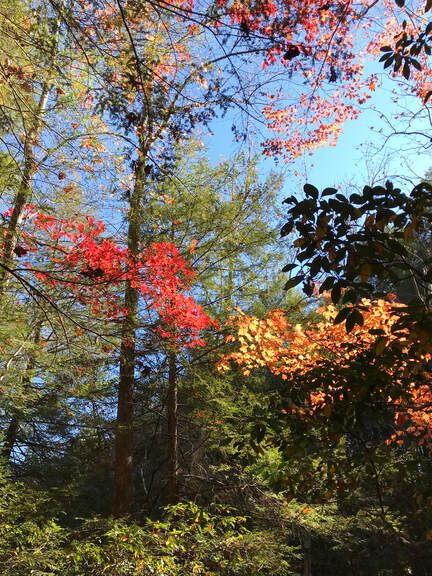 What colors do you surround yourself with? How do they blend or complement or contrast with your own? What frequencies do you absorb? What bounces off? 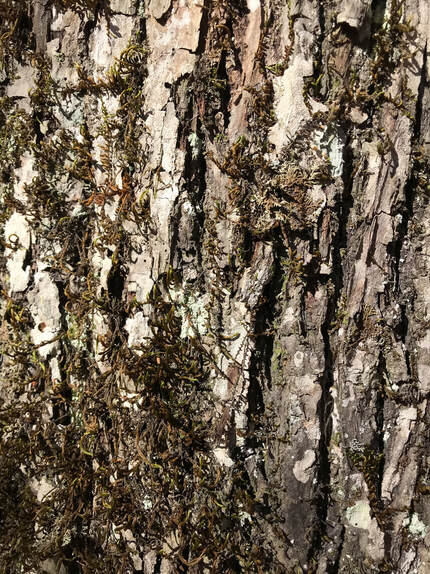 What’s your texture today? What coarseness is unavoidable at your age, given your life, experience? What strength can be created in the layers? What wisdom? What beauty? 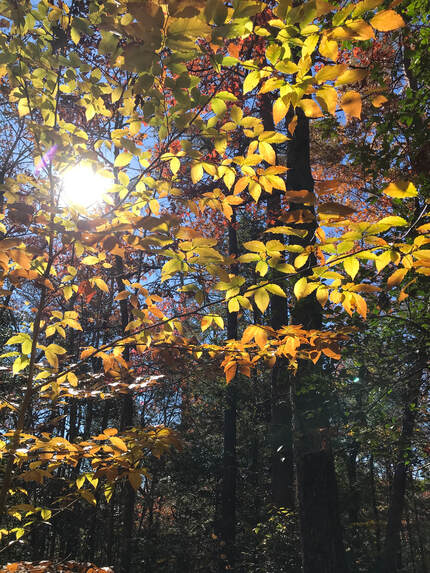 What’s your light source? Where do you find your light? Do you run toward it? Look askance? Turn your back? The light is there and it’s bigger than you. 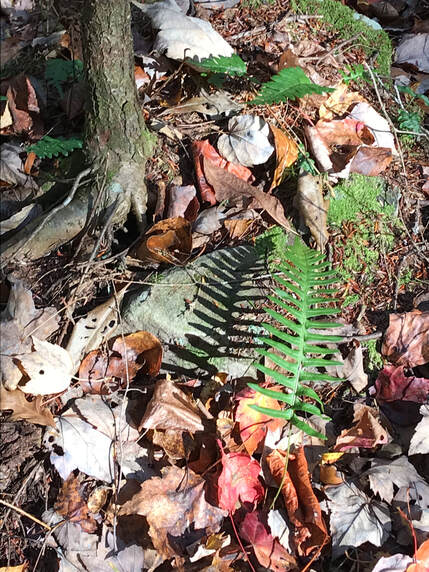 Where do you cast a shadow? How long is it? Is it getting bigger or smaller? Who is in it? What thrives in its cover? What fades or dies by it? 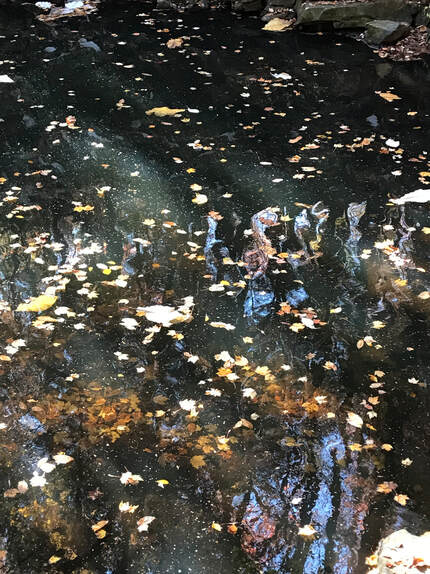 What’s your background? What past wraps you in stories without words? What blurs and fades? What defines your form? Your sense of shape? 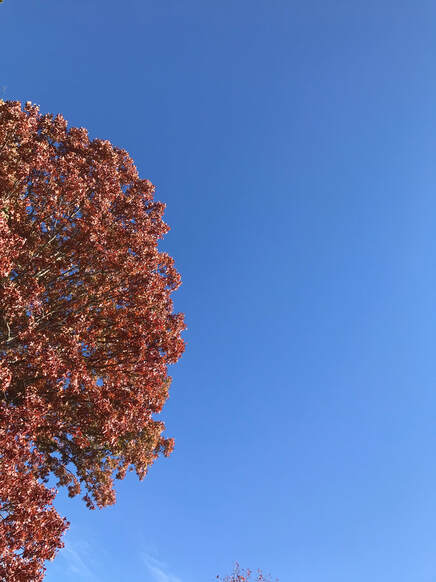 How much space do you take up? Do you fill the empty space? How much positive space? How much negative? Are you the right size in your world, for your world? 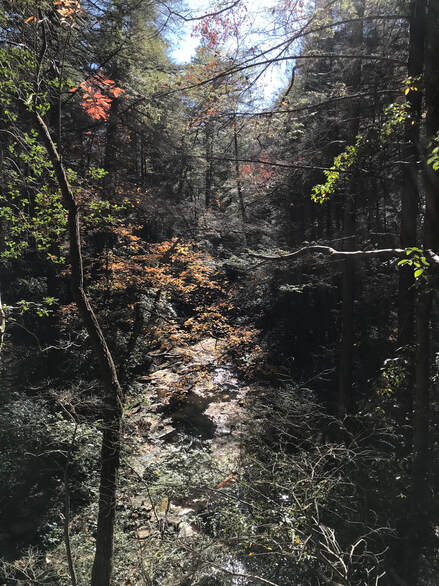 What is in front of you? What lies beyond the canvas? What will you see in tomorrow’s portrait? And tomorrow’s tomorrow? Where you look determines what you will have the chance to see. 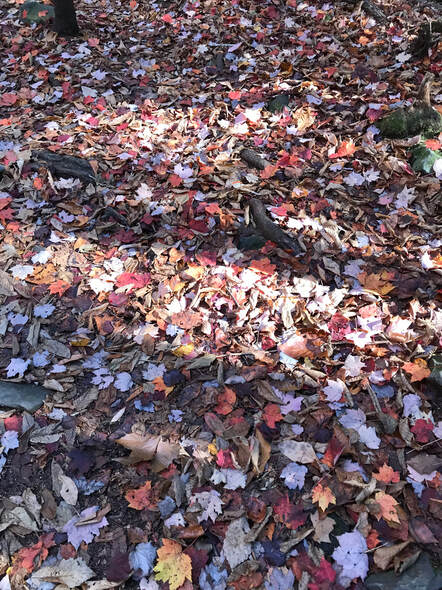 Do you accept the beauty? She didn’t ask where I find beauty or what I find beautiful. Its ever-presence was implied in her question. The question was whether and where and how I am willing to accept the gift. 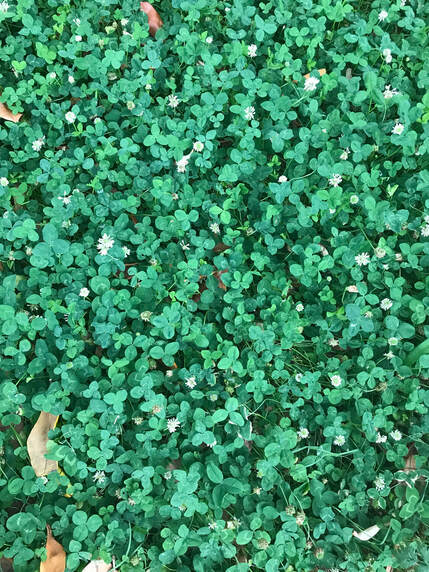 I was out walking my dog the other morning and as he started to slow his gait and do his extra-intensive sniffing, head down, gravity causing his lips to flap open to show his fangs, I knew he was about to do his business. Circle. Circle. Squat. Avert eyes! And there, as I looked away, in a lawn full of clover, a big, glaring four-leafed clover is staring right back at me. I ponder a moment to pass the time... Dog business complete. Steam rising. Bag over hand. Well, you know the rest. My business now also complete, I looked back to the four-leaf clover still glaring back at me. I picked it to take home to my daughters. You know, share the good luck! And, as I walked home with a big bag of shit in one hand and a four-leafed clover in the other, I felt there had to be some life learning in the symbolic contradiction and absurdity of the image. So, here we go: 1. Hold on carefully. Throw away intentionally. We best remember what we have in each hand! Hold on to the correct one. Throw the other one away. How we hold a four-leaf clover or a bag of shit with a loose grip, a tight grip, a couple of fingers minimizing any possible transfer to bare skin, a couple fingers gingerly trying to protect and save - this will remind us in our bodies what we are holding onto even when the mind wanders and life moves on. It will remind us what we need to let go of. We need to pay attention to how we hold things. 2. Clover with a pile of shit in it is still clover. A pile of shit in the midst of clover is still a pile of shit. Our circumstances don’t define or redefine us as we move through the shitty or clover-y parts of life. We define who we are and how we are in the world and carry that with us wherever we go – come what may. We also know this to be true for others. So, we should always recognize shit cloaked in clover for what it is. We also shouldn’t be blind to the clover just because there happens to be some shit around it. 3. Own your shit. We don’t have a lot of choice as to whether or when we have a four-leaf clover or a bag of shit. As with my walk, most of us have some of both most of the time. We can’t just drop the shit for someone else to deal with because it stinks, it’s gross, or we just want to pretend it’s all clover. We have to hold on to it carefully until we can dispose of it. It’s ours. Own it. But, get rid of it as soon as possible. 4. Seize the clover. We also don’t always have the choice to just focus on the clover. Sometimes, shit rules. Focusing on clover doesn’t magically make it disappear. So, when we do have the choice, we have to claim it. If we stop looking for the clover and holding carefully onto what we find, the shit just gets that much heavier and more stinky. Carpe clover. 5. Avoid pattern blindness. Look for the misfits. The four-leaf clover is a misfit. In the land of three-leafers, it’s probably ridiculed and bullied. But, when we look at a field of three-leafers, our eyes eventually blur and we don’t see much of anything specific or nuanced anymore. And then, the four-leafer jumps out! Our senses awaken and we start looking more closely, looking for more like it. We become curious. We become explorers. We look at all of the clover differently. One torturous part of the last year has been just how big I’ve gotten relative to my own socially-distanced, pandemic-contextualized smaller existence. To be clear, I’m not bigger and certainly not more important, but the world has closed in. It is smaller. As the world has shrunk around me, I’ve lost all sense of where I fit in the world - or how big it is, or how big I am in it.
Everything is more here, more now, more immediate, more real, more about me than it should be. In the oft-quoted words of David Foster Wallace: “everything in my own immediate experience supports my deep belief that I am the absolute center of the universe; the realest, most vivid and important person in existence. We rarely think about this sort of natural, basic self-centeredness because it’s so socially repulsive. But it’s pretty much the same for all of us. It is our default setting, hard-wired into our boards at birth. Think about it: there is no experience you have had that you are not the absolute center of. The world as you experience it is there in front of YOU or behind YOU, to the left or right of YOU, on YOUR TV or YOUR monitor. And so on. Other people’s thoughts and feelings have to be communicated to you somehow, but your own are so immediate, urgent, real.” The smaller the world, the stronger these truths. In social isolation, I am less informed and guided by the “socially repulsive”. A year in, I am processing all of this. A year in, I am trying to squeeze the learning out of it all. A year in, I am trying to discern meaning that is bigger than me. A year in, I am finally taking a break. A year in, I am finally sitting on a beach. My book in my hand. My book in my lap. My book on my chair. My brain begs me not to read, begs to be emptied - to be rejuvenated, rewritten. To be idle, not occupied. Present. My book might as well be full of empty pages. It won’t be read today. Above me, the whispy, vaporal nonsense of the white washed sky veiling the eternal blue. Before me, the noisy ribboning of the perpetual and timeless ephemera of the crashing waves. Beneath me, the infinite stories of life and death and formation and destruction told in the countless grains of sand thoughtlessly trampled. On the horizon, the vanishing act of the soaring bird as it dissolves into the sky only to reappear again. Reborn. I am recovering. I am growing again, ever so subtly. In this moment. Finally, not doing anything. For the last year, I have been living an extraordinary - but unexceptional - story, one we’ve all been a part of. A story in which I am more character than narrator, more illustrator than author. More object than subject. I must soon return to me, to writing my story. In many ways, I have lost my self in a year of perpetual demands on myself. I find it hard to choke back the tears. Saltwater. Amidst the crashing waves, the diminutive melancholy required for hope slowly replaces the abounding sadness that makes me feel grand. I can be big no longer. It’s not helpful to anyone. I must grow small. I must dissolve. Reconstitute. Only then can I write anything that matters. 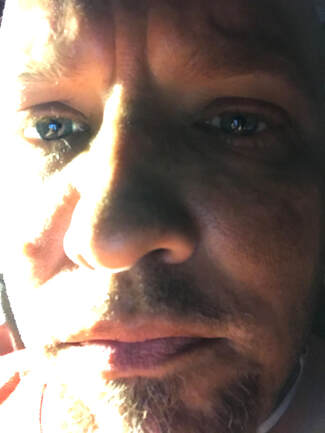 I’ve never known if I’m an introvert or extrovert, so I’ve just considered it a function of my surroundings - who I’m with and how many of them there are (and yes, probably whether or not I have had a drink or two). I also suck at bringing people together myself, which naturally feeds my introvert. But, I really do end up enjoying when others bring people together and I am one of those people - with a little effort feeding my somewhat reluctant extrovert. The year of Covid, however, has force-fed my introvert. There haven’t been any even reluctant options to balance him out. Initially, this felt ok, like maybe this whole work-from-home and forced isolation thing might have just put me square in my wheelhouse. This isn’t so bad - at least for the first couple of months. And yet, time kept feeding the isolation. My introvert kept ingesting it with no other choice. A touch of indigestion perhaps setting in. And more. The normally passive and quiet introvert starts gorging himself grossly on the all-you-can-eat bar of social isolation and disconnection. That subtly perverse drive of the over-stuffed to go back for one more taste, maybe a touch of desert. And…still…more. The absence of hugs or hand shakes. No smiles. The lack of reason for normal dressing, or even showering at the usual cadence. The loss of my physical self at least in relation to others has brought a certain ignorance to my body. The physical vehicle once supporting and transporting the spirit - and vice versa - becomes an object, dynamic in nature, but rather dumb in practice. My introvert has eaten its fill and now rests bloated, in pain, and putridly satisfied on this his year of Covid. I am not an introvert. Like a new year’s resolution, I am desperate to disrupt this gluttonous isolation. There’s still a flicker in me that remembers laughing and being stupid with friends, creating passionately with co-workers, engaging serendipitously with strangers - even enjoying isolation as a counter force to something else, not itself all things. And, while I dream of it, this miracle land of extroversion, it also stirs some anxiety. I don’t know if I have the tools for this return any more. Will it be like riding a bike? Or, will I have to work at it, to teach myself again, to overcome an even greater reluctance? I am not an extrovert. My now shapeless, boundless introversion has left me unsure, unskilled - and yet desperate to know. Dearest Banter,
It’s been so long since we last connected that I just felt compelled to sit down and write you. It’s so uncharacteristic of our relationship, I know, so formal, and yet it’s all I have. I wanted and needed to assure you that while we’ve been apart for most of 2020, I still need you. I didn’t mean to demean or belittle or hurt you by trying to translate our relationship to text message. It was an honest effort, but I know you must have felt used and cheapened and I’m sorry. I wrestled in writing this as I am not even sure who left whom this year. I feel like I’m still the same guy, still need you like I always have. But, I do recognize I’ve not exactly been able to give you what you need this year either - to invest in our relationship fully. There’s a lot of heavy stuff to unpack there, but I know that’s really not your style. Again, I don’t know if I am asking for your commitment or mine at this point, but I need a few things in 2021 if we are going to make this work. While I know I’m just another of your many grown-men-turned-instant-juvenile-delinquent-in-your-company, you mean a lot to me. So, I guess maybe this is a plea for commitment, for patience, for help. I desperately need to be stupid. Banter stupid - and only you know exactly what I mean. More on the ridiculous side of stupid where you aren’t sure if you accidentally ended up saying something profoundly smart. And yet, with your gift and permission, riffing in presumed brilliance. I desperately need to talk about nothing. I need to leave a conversation after coffee or after a beer or a bourbon with a smile plastered all over my face and joy in my body. And when someone asks me what I talked about, I am either too embarrassed to say (it wouldn’t make any sense out of context anyway) or I genuinely don’t remember because it was all complete nonsense. And finally, I desperately need to laugh like a 13 year old boy about stuff a 13 year old boy would laugh about. I’ll spare the common details here assuming you are clear. Message me if more color is needed. But, I think you get the idea. I need to stir the pot of the youthfully absurd, to cringe a little at someone going too far, to inevitably end up talking about farts. Banter, my dear friend, I will clearly need some time to get settled back in, to get reacquainted, to re-awaken my sensibilities and re-sharpen my tools for your beautiful art. But, I know I can do it. I just need the time. I will commit right now in this letter and on paper to doing my part in 2021 to bring us back together, but you’ve got to do yours. I need to see old friends in person. I need the time with them to digress - and to digress on that digression. 2020 has been a long and lonely and brutal year in your absence. Let’s let 2021 be the year we brought Banter back! Sincerely and always, Anderson I always hesitate to write about things I know everyone else is writing about - unless I feel I have something unique to say. I wasn’t sure what I could write that would add anything to 2020 and figured I’d just let the year end without commentary. There’s been a lot of commentary.
And then, as I sat with my family in my living room, my precious children unpacking their Christmas stockings, the warmth of love and a fireplace washing over us, accented by the early morning light - we were all assaulted by the shockwave energy of a car bomb - slowly, methodically rumbling to a horrifying crescendo - passing through our house and our bodies and our beings in just a few seconds. The energy was palpable; the source then unknown. We all leapt to figure out what the hell had just happened. Moments fearing mass casualty. Moments of terror. Protecting Christmas morning for my kids. Early pictures coming in. A bomb in an RV. Processing. The energy of the bomb still echoing and bouncing around within me. Gifts to be opened. Fire still burning. Merry Christmas. The slow, unfurling of trauma - the new climax of what actually started in March. And still, I have felt the need to apologize or add a disclaimer for my commentary on 2020. After all, I didn’t lose my business or my home in the 2020 Nashville tornado or the massive wind shear just a few weeks later. I lived it, but only lost a chimney. I know people who lost everything. I didn’t lose my job in a collapsing economy - and yet tens of millions have. I didn’t lose the end of my kindergarten year and all of my first grade year. I didn’t lose 2nd and 3rd grade. My daughters did. I didn’t lose my home to foreclosure. I didn’t lose a child or a brother or a friend to police brutality or racial violence. I have not even lost a close friend or family member yet to Covid. Neither my house nor my business was bombed on Christmas Day. I’ve seemingly been on the edge of it all. Indirect hit after indirect hit. Yet, I have felt it. I’m wearing it. I see it in my own face. For months, I have been “white knuckling it.” Gripping the fucking wheel and focusing on the road right in front of me. Control what I can control. Stay present. Manage. And, the more I thought about it, the more I realized that this is probably most of us. I have been traumatized by 2020. We have been traumatized. Regardless of my or your lack of personal tragedy in the year, or direct hit from the year - if you too have been so lucky - our basic empathy seeds our trauma. Practically demands it. So, “moving on” from 2020 is going to take a lot more than a shot in the arm. There is no inoculation from trauma, and we have more grueling months of the pandemic ahead of us and more to endure. The work of moving past 2020 will require each of us to do deep work on ourselves and with others to understand how 2020 has changed us. Surely, we have all learned something about ourselves and the world and our values and our politics this year. But, what is less clear is the emotional toll the year has taken on us. We must be aware how we have changed emotionally to ensure growth and avoid emotional stunting or regression. We must grow. We must cultivate our hobbies and our physical, mental, and intellectual health with deliberate investment and intentionality that has never previously been required. We must recognize that the energy and spark that our passions once brought may be only sufficient to keep us afloat rather than making us soar. We must stay afloat. But, we also must find new ways to stay afloat, so that we again may soar. We must find reasons to smile in isolation and seemingly without reason to replace the happenstance smile and joy of an interaction with a stranger on the street or with a server at a restaurant or running into an old friend out of the blue. We must hear ourselves when we talk to our kids and our spouses and those we care about most in the world and ensure we nourish our own patience and invest in our own presence such that we may also model it for them. We must be aware when we feel the walls of our homes closing in on us - as home continues to be office (and school) and office continues to be home and find our way to more open spaces within and around us. We must deal with our trauma. In other words, we have to work our asses off in 2021 (and beyond). Normal will not return. The new normal - at least a healthy one - won’t just happen. We have changed, been changed. We have been traumatized. We must now live and work to transform this reality into a healthy and necessary new foundation for any meaningful recovery. 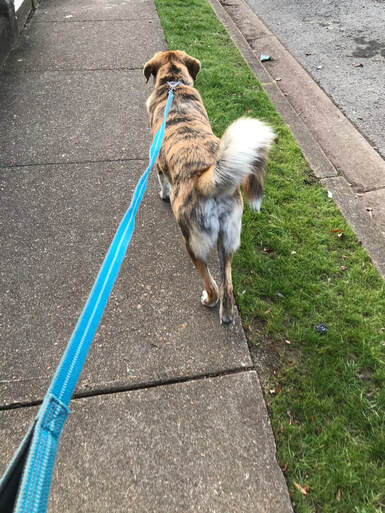 My kids were learning recently about natural disasters and the conversation led to the wonder of how animals often sense disaster coming before humans have a clue. It’s a fascinating demonstration of how instinctively in tune with the larger world they are - and, inversely, how out of tune we often are. I recalled for them the horrible 2004 Indonesian tsunami and the stories of how the animals all ran to higher ground well before the waves arrived and all but wiped that part of human civilization off the map. I had never conceived of such a disaster, nor such a response. Both are still difficult to fathom. While certainly different, 2020 has been a natural disaster of its own - both the Covid part, and the lack of early competent response from humans (the incredible feat of the vaccine is the hopeful counterpoint to the absurdity of people’s fighting over wearing a mask). This year, humans have demonstrated an entirely new capacity to be out of tune with themselves and the world around them. I’ve been a bit lost and dismayed about this reality - how humanity has shown its ass this year and what that means for the future (again, a strong counterpoint thankfully provided by our teachers, nurses, and doctors). As I was mulling this yesterday, I just happened to be following my dog who was pulling ahead of me as I took him on a walk to the post office. He doesn’t know what the post office is. Now, I know dogs aren’t exactly the top of the animal kingdom and that our domestication of these sweet animals has certainly made them dumber and less naturally capable, but certainly more loving and lovable. Domestication has had a similar impact on me. Yes, he sniffs the greasy base of a fire hydrant and the still-glistening blades of monkey grass as if he were delving into the depths of quantum physics. Yes, he’ll roll over and unabashedly lick his private parts whenever the need strikes and regardless of who else is around. Yes, he actually stepped square into another dog’s poop as I was on my way back home to write this post. But, this dog is in tune with something greater, I swear. Today, as I turned left onto South 11th Street, about 30 yards down, he started pulling me out into the road, seemingly wanting to cross to the other side. Turns out, he knows where Bongo Java is and is apparently deeply in tune with my coffee needs. He was pulling me to the coffee shop. “Not today, Fitz. We are heading to the Post Office. But, thank you for the offer.” On our way back from the Post Office, we were walking along the South side of Woodland Street, and again, the dog starts pulling me out into the road, seemingly wanting to cross the street. “What the hell are you doing, Fitz!? There are cars!” And, then I realized that we were approaching Woodland Wine Merchant on the other side of the street. He was pulling me to the liquor store. “Not, today, Fitz…well…OK…if it means that much to you.” Returning home with a happy dog and a bottle of bourbon, I felt one with nature. It’s gonna be OK. My dog understands 2020 and coffee and bourbon and me. It’s really pretty amazing and profound - that deep animal instinct and intuitive connectedness. Also, both Bongo Java and Woodland Wine Merchant offer complementary dog treats when you visit, but that probably doesn’t have anything to do with it. 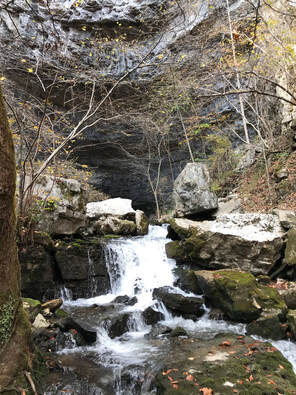 The approach of Thanksgiving prompts some much needed reflection on 2020, this the year of the shit show. So, here are a few thoughts on gratitude: 1. Gratitude is the foundation of presence. Gratitude requires focus on what you have, not what you’ve lost, are missing, or wish you had, what was or what will be. The sense of loss and longing and loneliness and anxiety that feel so natural to 2020 are only exacerbated in gratitude’s absence. The opposite of gratitude is not being ungrateful, but rather being unrooted. 2. Gratitude is richer when it is more difficult to come by. Sometimes it’s just hard to feel thankful for anything, but these are the moments when gratitude is most potent. Like most anything, the gratitude you have to work for arrives enriched by the investment. So, taking the time to be reflective, to see yourself and the world, yourself in the world, to explore those around you and those who are no longer, to empathize deeply, frequently to the point of tears of joy or sorrow, to learn something, to share something - this is the work of gratitude. And, its reward is far greater than the effort and far more complete than thoughtless appreciation. 3. Gratitude requires perspective. For pretty much the duration of the pandemic, I’ve had a bulging disc in my neck. I’ve been in regular and at times near constant pain. I’ve wanted to complain, but, you know what: who gives a shit!? I don’t have Covid. I don’t have cancer. I’m not going to die. My fortune is plentiful. My privilege is grotesque. Gratitude dilutes the need to complain - even, and perhaps especially, if you have to remind yourself. I am grateful for my health - as it is. I am grateful for the health of my family and friends and that I’ve lost no one close to me to Covid. 4. Some days, gratitude is all you have to get you through the day - and, that’s ok. I lost a friend this summer who I loved dearly, even though I saw her infrequently. Her loss was tragic and painful and her absence has surfaced my deep gratitude not just for her and her life - but for the people and life I lived when we met more than a decade ago. It has spurred deep reflection on the positive impact others have had on my life, hopefully that I’ve had on others, and a deep re-digging into why I am here. While her loss had me feeling lost and untethered, it has in my gratitude for her deeply rooted me. 5. Gratitude is a gift to be exchanged. It’s important to do things for others, to be a part of other people’s lives, to feel part of a community. This can be helping or being helped, or something as simple as engaging in a random conversation at a coffee shop or even just viewing someone else’s art in a gallery. It’s connection. It’s exchange. Of ideas. Of energy. Giving and receiving. In a time of social isolation, these connections are harder than ever to find. Deliberate effort is required. While gratitude for others is critical for creating meaning in life, feeling the gratitude of others is critical to finding it. This year has been a shit show, and yet I find myself more grateful than ever. But, I’ve had to work for it. For that, I am grateful. |
Categories
All
Archives
April 2024
|
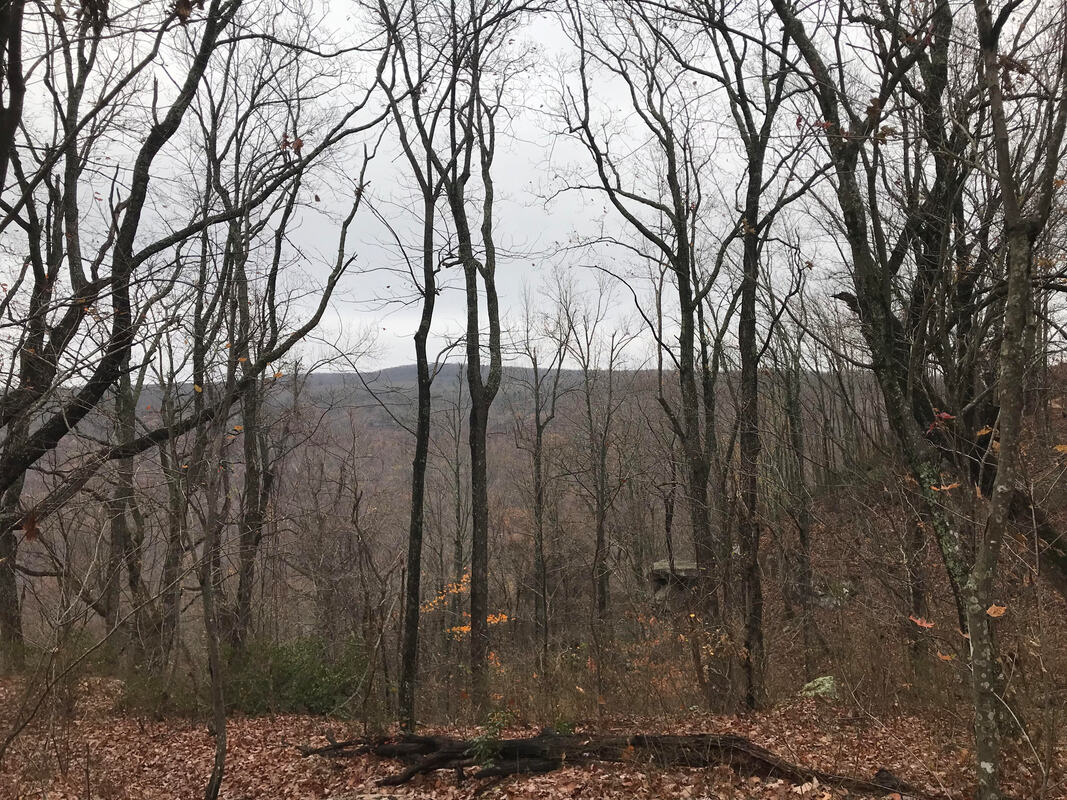
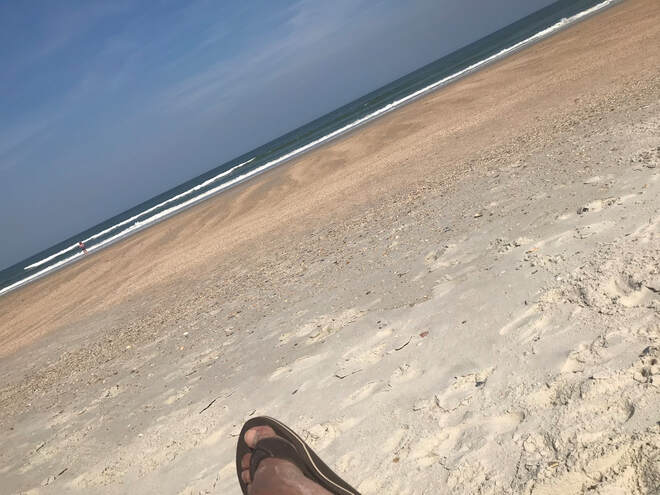
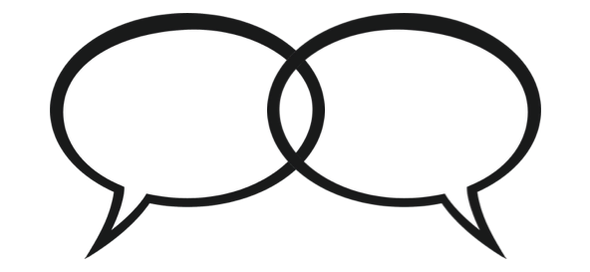
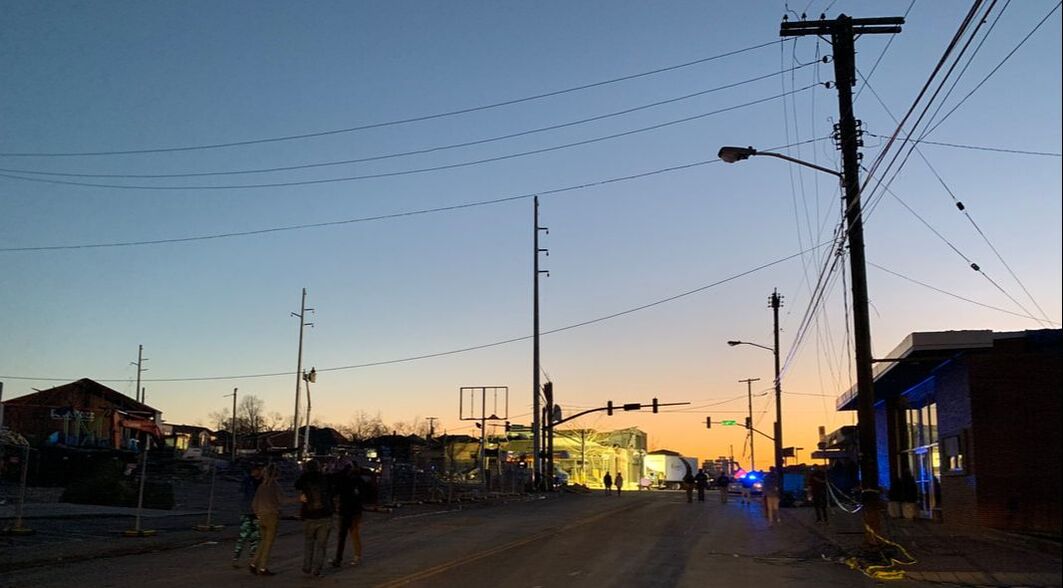
 RSS Feed
RSS Feed